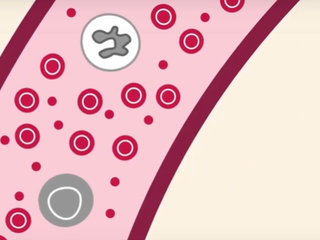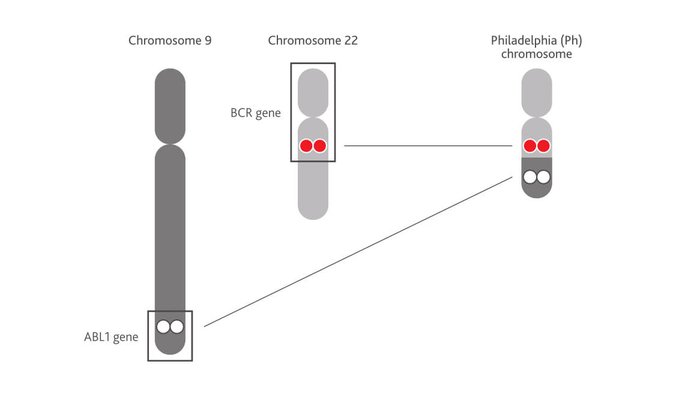What is acute lymphoblastic leukaemia (ALL)?
ALL is a fast-developing type of blood cancer that affects cells called lymphoid blasts (or lymphoblasts).
Blood contains three types of cells: red blood cells, white blood cells and platelets. Each type has several different jobs to do in the body. We have more information about blood cell development.
- Red blood cells contain a protein called haemoglobin, which carries oxygen to all the tissues of your body. Muscles and other tissues need oxygen to use the energy you get from food.
- White blood cells are an important part of the immune system. Their job is to help fight and prevent infection. There are different types of white blood cell including lymphocytes, monocytes, and granulocytes.
- Platelets stick together and form clots to stop you bleeding if, for example, you have a cut or a bruise.
ALL affects cells called lymphoid blasts (also called lymphoblasts or blast cells) in your bone marrow. These are a type of white blood cell, which are a vital part of your immune system. Normally, lymphoid blasts mature and develop into lymphocytes, which fight infection.
Your body needs new lymphocytes all the time, and it usually makes the right amount. When people have ALL, this process goes wrong. The blast cells multiply too quickly, and they don’t develop properly. We call these abnormal blast cells leukaemia cells. They build up in your bone marrow until eventually there’s no room for normal blood cells to be made there. So your body doesn’t have enough white blood cells, red blood cells, or platelets to work properly. This can lead to a variety of symptoms.
ALL develops more quickly than some other blood cancers, so fast diagnosis and treatment are really important.
Information for young adults
For young adults with leukaemia, lymphoma or any blood cancer type.
Your guide to treatment, side effects, coping with emotions, friends and work or study.

Types of ALL
There are different types of ALL. The treatment you have may be different depending on the specific type you’re diagnosed with. There are two types of lymphocytes known as B cells and T cells. When you have ALL, it usually affects one type or the other, so doctors will say you have either B-cell ALL or T-cell ALL. These pages are about B-cell ALL, the more common type. If you are diagnosed with T-cell ALL, ask your healthcare team for more information about your treatment and prognosis (outlook).
Philadelphia positive ALL
Around one in four adults with ALL have Philadelphia positive ALL. This means the leukaemia cells develop because of a very specific genetic fault that’s only present in the abnormal cells, not throughout your body. It is not the sort of genetic fault that can be inherited.
All cells in your body contain a set of ‘instructions’ which tell the cell what to do and when to do it. These instructions are stored inside the cells in structures called chromosomes. The chromosomes are made up of a chemical known as DNA, which is arranged in sections called genes.
There are 23 pairs of chromosomes in each cell in your body. When cells divide to form new cells, the chromosomes normally stay the same in each new cell.
We think Philadelphia positive ALL begins when something goes wrong by chance. A small part of chromosome 9 (the ABL1 gene) gets stuck to a small part of chromosome 22 (the BCR gene) when the cell divides. This forms a new fusion gene called BCR-ABL1 and makes chromosome 22 shorter than normal. This new, shorter chromosome is called the Philadelphia chromosome, because it was discovered in Philadelphia in the USA.
This swapping of genetic material is called a translocation, or chromosomal translocation. This particular translocation is sometimes called t(9;22).
The new BCR-ABL1 gene is important in the development of Philadelphia positive ALL because it makes a new protein known as tyrosine kinase. This protein is a type of enzyme (a substance which speeds up chemical processes), and it causes the leukaemia cells to divide more often and to live longer than usual.
If doctors can spot the BCR-ABL1 fusion gene, it can help them to diagnose ALL and monitor how well you respond to treatment. The standard treatment for Philadelphia positive ALL is to take drugs that block the effects of (inhibit) the tyrosine kinase enzyme. These drugs are called tyrosine kinase inhibitors or TKIs.
Other types of ALL
There are many other types of ALL, based on the many different genetic changes that can happen. The prognosis for each type varies. At the moment, there are no specific therapies for these different types of ALL and they are all treated in the same way, but scientists across the world are working to develop more targeted treatments. Your doctors are likely to carry out specific genetic tests on your leukaemia cells, but the results might not be available until a few weeks after diagnosis.
What causes ALL?
We don’t know exactly what causes ALL, but we do know there are some things that may make it more likely for someone to get the condition.
It’s important to know that none of your lifestyle choices have contributed to this condition, and it's not possible to ‘catch’ ALL or any other type of leukaemia.
ALL is the only type of leukaemia that affects children more often than adults. When it does affect adults, they are more likely to be younger adults, and least likely to be middle-aged.
ALL then becomes more common again in older age. We don’t know why the risk is different at different ages.
ALL is slightly more common in men than women. We don’t know why.
Although people with ALL have a genetic fault in the leukaemia cells themselves, this is not something you inherit from your parents or pass on to your children.
However, some genetic conditions such as Down syndrome carry a higher risk of developing ALL.
Radiation in high doses can lead to leukaemia, but it’s unlikely to cause many cases in the UK, if any at all.

What is blood cancer?
Find out how blood cancer starts and how it can affect your body

